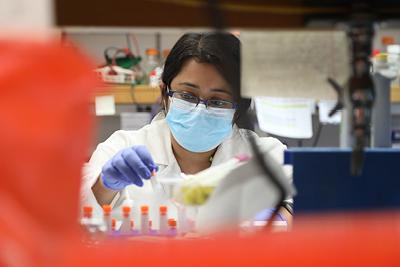
Postdoctoral fellow Binita Chakraborty, PhD, was intrigued: in published analyses of large numbers of patients with melanoma (skin cancer) treated with an immunotherapy that is becoming standard of care, the treatment worked better in men than in women.
“There may be multiple reasons why the response may be different between males and females,” she says. “But one of the biggest differences that stands out was circulating estrogen levels. Estrogen levels are much higher in females than males.”
As a breast cancer researcher, Chakraborty knows a bit about estrogen. When she told her mentor, Donald McDonnell, PhD, that she wanted to explore what was really behind this connection, he told her to run with it.
Her findings are leading to a Duke clinical trial in the works that may make immunotherapy work better for people with melanoma, as well as other cancers.
New to studying skin cancer, Chakraborty knew just who to call— Duke physician-scientist Brent Hanks, MD, PhD, who treats patients with melanoma and studies the disease. Hanks helped her establish tumor cell lines and mouse models that mimic humans with melanoma. The mice have mutations that are present in up to 70 percent of people with the disease—a mutation in a protein called BRAF and a deletion in a different protein known as PTEN.
In all the tests that Chakraborty did with these mice, estrogen increased cancer growth. But not in experiments with isolated tumor cells in culture dishes.
“When we cultured the tumor cells, then put in estrogen, they were not growing faster or doing anything,” Chakraborty says. “None of these tumor cells themselves were actually responding to estrogen.”
 In mice with melanoma, estrogen shifts the balance toward the bad macrophages.
In mice with melanoma, estrogen shifts the balance toward the bad macrophages.
That told her that the estrogen must be influencing something in the tumor “microenvironment” – the community of cells that surrounds the tumor and nurtures its growth. “The tumor tries to hijack he environment around it to help itself grow faster,” Chakraborty says.
To find out how estrogen is making melanoma worse, she did experiments in a mouse that doesn’t have a functional immune system. In those mice, whether she treated with estrogen or not, the tumor growth stayed about the same. “That got us to hypothesize, okay, estrogen must be affecting the immune cells in the microenvironment,” she says. “The tumor is growing fast in response to estrogen only when the immune cells are present.”
The tumor microenvironment contains many different types of immune cells, but Chakraborty found that in melanoma, estrogen particularly affects one type—macrophages. She explains that normally there is a balance between “good” macrophages, which can help alert T cells to a tumor so they can kill it, and “bad” macrophages, which help a tumor grow by promoting blood vessel growth and impairing T cell function.
Chakraborty shared these findings with Scott Antonia, MD, director of the Duke Cancer Institute for Cancer Immunotherapy, to get his perspective as a clinician. He was immediately interested. Unbeknownst to Chakraborty, Antonia had been studying lung cancer patients who had stopped responding to an immunotherapy called a PD-1 inhibitor. In these patients, “bad” macrophages were increased in proportion to “good” macrophages. Just like in Chakraborty’s mice with melanoma.
So, Chakraborty did some experiments in mouse models of non-small-cell lung cancer. She found that estrogen increased “bad” macrophages in lung cancer too.
Based on these results, Antonia is now writing a clinical trial to combine a newer anti-estrogen drug used to treat breast cancer with a PD-1 inhibitor, in patients with melanoma, non-small cell lung cancer, and gastric (stomach) cancer. He hopes that inhibiting estrogen will improve patient responses to this type of immunotherapy.
“Binita is firing on all cylinders,” McDonnell says. Even while she and her husband, a scientist at UNC-Chapel Hill, juggle homeschooling their six-year-old son during the COVID-19 pandemic, she is having many of the early successes that can prepare her for becoming a faculty member. And McDonnell is thrilled. “I still get a buzz out of publishing papers, but I get a much bigger buzz out of seeing the next generation of cancer researchers succeed and get on their way,” he says.
DISCLOSURES: Donald McDonnell, PhD, is involved in the company developing the drug that will be used in the clinical trials mentioned in this story.
This article appeared in the Winter 2021 issue of Breakthroughs magazine. Breakthroughs is produced twice yearly by Duke Cancer Institute Office of Development.